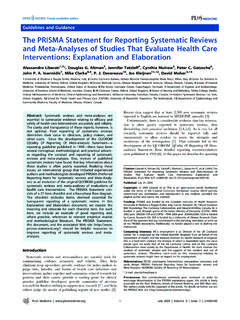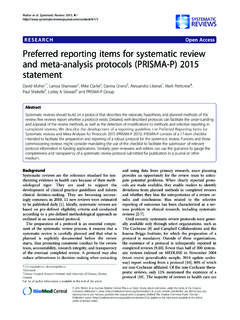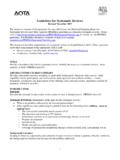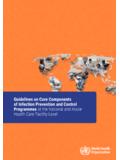Transcription of Guidelines for contributors - WHO
1 Bull World Health Organ 2018;96:75 76| doi: for contributors1. Scope and editorial ContentThe mission of the Bulletin of the World Health Organization is to publish and disseminate scientifically rigorous pub-lic health information of international significance that enables policy-makers, researchers and practitioners to be more effective; it aims to improve health, partic-ularly among disadvantaged populations .The Bulletin welcomes a variety of un-solicited manuscripts (see below, ). These are initially screened in house for originality, relevance to an international public health audience and scientific rigour.
2 If they pass the initial screening, they are sent to peer reviewers whose opinions are taken into account by the journal s editorial advisers when they decide whether to accept a manuscript for publication. Accepted papers are subject to editorial revision, which may involve substantive changes, shortening or re-structuring the text and deleting super-fluous tables and figures. The word limits given for each type of contribution do not include the abstract (where applicable), tables, boxes, figures and references or appendices, if any.
3 The principal types of manuscripts are outlined Unsolicited manuscriptsWe welcome unsolicited submissions to the Research, Systematic reviews, Policy & practice, Lessons from the field and Perspectives sections of the Bulletin. All manuscripts destined for the first four of these sections must include two paragraphs indicating what they add to the literature. The paragraphs should briefly explain: what was already known about the topic concerned; what new knowledge the manuscript , methodologically rigorous, of relevance to international public health.
4 Formal scientific presentations having not more than 3000 words and 50 references, plus a structured abstract (see below, ); peer reviewed. As clear reporting is needed for readers and reviewers when judging the quality of research, studies should comply with the relevant reporting Guidelines , available on the EQUATOR Network website, at: Operational and implementation re-search should be reported in compliance with the Guidelines published in this issue (available at: ). Inter-vention trials as defined by WHO ( any research study that prospectively assigns human participants or groups of humans to one or more health-related interventions to evaluate the effects on health outcomes ) require registration in a public trials registry acceptable to the International Committee of Medical Journal Editors (ICMJE) before submis-sion, and the registration number must be provided at the end of the abstract.
5 Acceptable registries are listed at: Web publication constitutes prior publication. This includes institutional websites that are open to the general reviews Exhaustive, critical assessments of pub-lished and unpublished studies on re-search questions concerning interven-tions, policies or practices in public health, with meta-analysis when fea-sible. Not more than 3000 words plus a structured abstract (see below, ); the number of references in accordance with the scope of the review; peer reviewed.
6 How studies were included and excluded should be illustrated in a flow diagram. Authors should strictly follow the report-ing Guidelines for systematic reviews and meta-analyses (PRISMA) available at: Policy & practiceAnalytical assessments, debates or hy-pothesis-generating papers; not more than 3000 words and 50 references, plus a non-structured abstract (see below, ); peer from the fieldPapers that capture experiences and practice gained in solving specific public health problems in developing countries. Convincing evidence of effect should be provided.
7 Not more than 1500 words and 15 references, plus a structured abstract (see below, ); not more than one table and one figure; must include one box listing three lessons learnt; peer re-viewed (see: ). Operational and implementation research reports should follow the specifications described above for the research section. PerspectivesViews, hypotheses or discussions (with a clear message) surrounding an issue of public health interest; up to 1500 words, no more than 12 references; peer Commissioned manuscriptsThe categories of articles shown below are normally commissioned by the editors.
8 Authors wishing to submit an unsolicited manuscript for one of these categories should first contact the editorial office (see below, ).EditorialsAuthoritative reviews, analyses or views of an important topic related to a theme or to one or more papers published in a given issue; not more than 800 words, maximum 12 tablesA base paper on a controversial current topic in public health (not more than 2000 words and an abstract) is the core of a debate by several discussants invited to contribute not more than 500 words Ethical issuesThe World Health Organization (WHO)
9 Publishes the results of research involv-ing human subjects only if fully compli-ant with ethical principles, including the provisions of the World Medical Association Declaration of Helsinki (as amended by the 59th General Assembly, Seoul, the Republic of Korea, October 2008; available at: ) and with the additional require-ments, if any, of the country in which the research was carried out. Any manuscript describing the results of such research must contain a clear statement to this effect and should specify that the free and informed consent of the subjects or their legal guardians was obtained and Guidelines for contributorsBull World Health Organ 2018;96:75 76| doi: for contributorsthat the relevant institutional or national ethics review board approved the inves-tigation.
10 The Bulletin is a member of the Committee on Publication Ethics (COPE; see: ). Issues involving publication ethics may be re-ferred to this committee by the editors. WHO Research Ethics Review Com-mittee clearance is required for papers that report research supported by WHO or that are authored or co-authored by someone who was a WHO staff member while the research was Competing interestsA competing interest arises when a professional judgement concerning a primary interest (such as patients wel-fare or the validity of research) may be influenced by a secondary interest (such as financial gain or personal rivalry).















